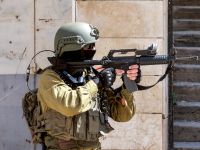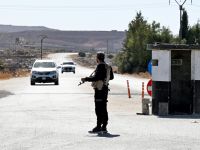The Saudi government is censoring a prominent Arabic-language newspaper after it published a column saying the Information Ministry controls the press in the Saudi Kingdom, the paper's regional director and author of the column said Saturday.
In another statement that day, questioning the issue of press freedom in Saudi Arabia, a writer criticized the Saudi media for not reporting the firing this week of an editor whose paper printed a poem accusing Islamic judges of being corrupt and following the orders of "tyrants." The Saudi Interior Ministry ordered the dismissal of Mohammed Mokhtar al-Fala, editor-in-chief of the Al-Madina daily, earlier this week. The poet, Abdul Mohsen Musalam, was sent to prison.
"Our press does not publish such news, which proves that it is still a prisoner to its weakness," liberal Saudi writer Abdullah Nasser al-Fawzan wrote in an op-ed in the Al Watan daily, accusing senior editors of practicing self-censorship to comply with the wishes of the Saudi government.
For his part, Dawood al-Shirian, regional director of the London-based daily Al Hayat, told AP News Agency that the Saudi issue of the paper has been subjected to censorship by the Information Ministry since Friday, the day after his column criticizing the ministry was published.
Al Hayat, one of the most widely read Arabic-language dailies, is owned by Prince Khaled bin Sultan, son of the Saudi defense minister. It is printed in several countries, including Saudi Arabia. The censors seek articles critical of the government and may stop the paper's distribution in Saudi Arabia if they find any, al-Shirian explained, according to AP.
He said subjecting Al Hayat to censorship "is not in the interest of the kingdom, harms the country's budding press freedom and sheds doubt on any talk the government intends to open up."
Meanwhile, a senior Saudi Information Ministry official, Misfir al-Misfir, declined to comment about Al Hayat in particular, however said all newspapers published outside the kingdom are subjected to censorship.
Al-Shirian, however, said Al Hayat ought not to be censored. He said a royal decree issued a year ago stipulated that it should be treated as a domestic paper. Newspapers in Saudi Arabia are privately owned, however their content is guided by the government. While they are not usually reviewed by censors prior to their publication, they rarely criticize the authorities.
Interestingly enough, however, Saudi dailies launched an unprecedented attack on two of the country's chief Islamic pillars, the religious police and the girls' education authority, which is controlled by strict Islamic clerics, following a fire at a girls' school in Mecca this month left 15 of its students dead.
Saudi newspapers accused members of the religious police of blocking rescue attempts by male firefighters and paramedics because the girls were not completely veiled. The police and Interior Ministry denied the accusations, and the criticism has decreased since Information Minister Fuad al-Farsi met with the chief editors of Saudi papers last week.
In his column, al-Shirian criticized the newspapers for not reporting the content of that meeting and carrying instead a bland report about it by the official Saudi Press Agency (SPA).
Al-Shirian, who did not participate in the meeting, said that what was not printed was a discussion about press restrictions that he said allow the government to control the content of articles.
He said the restrictions include the need to have religious edicts approved by a government-run committee before they are published and reports on major crimes checked by authorities for factual errors.
In addition, he said that in the course of the meeting, al-Farsi ignored some journalists' objections to a recent press charter that imposes a fine on newspapers for reports the Information Ministry finds in violation of new, unpublished guidelines. "The issues that were taken up during the meeting are not military secrets and despite that, they were blacked out," al-Shirian said in the column.
He added that the fact that the substance of the meeting was not reported "gives a true picture of how the Saudi media treat news." (Albawaba.com)
© 2002 Al Bawaba (www.albawaba.com)







